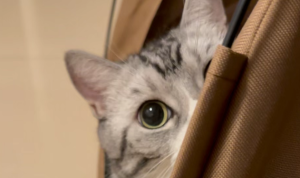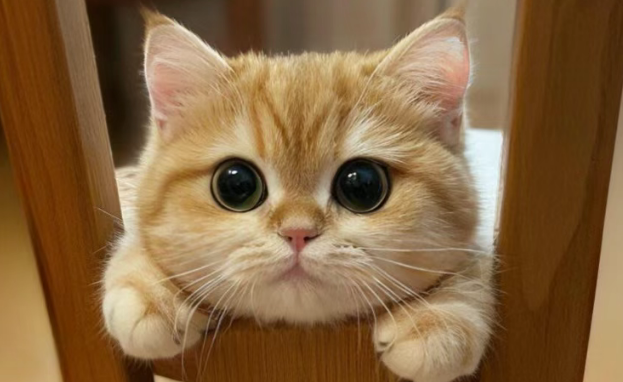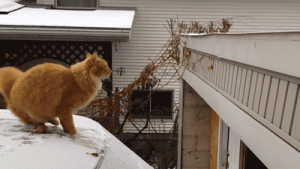Yesterday, a fellow cat owner mentioned that their cat was unusually cooperative during bath time—something that felt like a once-in-a-lifetime miracle.But not long after, they reported again: the cat had torn open a drawer, ripped apart a bag of snacks, and devoured everything inside.As the saying goes, when a child is suddenly quiet, they’re usually up to mischief. So, when a cat gets into trouble and then instantly acts like a sweet, obedient angel—does that really mean it knows it did something wrong?The truth is, sometimes cats really do appear calmer or more well-behaved after causing chaos. But this behavior usually isn’t because they “feel guilty” or “know their mistake.” Instead, it often stems from other instincts and reasons deeply rooted in feline nature.
-
Instant “obedience” (actually hiding or freezing)
Reason: Cats are extremely sensitive to changes in their environment. When they get into trouble—like knocking something over and making a loud noise—the sudden sound or movement can scare them. This is a natural fear response.
Behavior: They may freeze instantly, puff up their fur, then dash to a corner, under the bed, or a high perch on the cat tree, or curl up into a ball, appearing very “obedient.”
Common Misinterpretation: Owners often think the cat “knows it did something wrong,” feels “guilty,” or is “reflecting.” In reality, the cat is mainly avoiding a potential threat (the loud noise or sudden movement) or is startled by its own actions. This “obedience” is a stress response, not a moral reflection. -
“Obedience” after hiding
Reason: After causing mischief, if the owner notices and shows displeasure (like raising their voice, making large gestures, sighing), cats can pick up on these emotional and physical cues. They associate the negative atmosphere with themselves, though not necessarily knowing exactly what they did wrong.
Behavior: They will hide to avoid the owner’s view and appear unusually quiet. Sometimes they may over-groom (a self-soothing behavior).
Common Misinterpretation: This is often misread as “guilt” or “reflecting.” In truth, the cat is avoiding a source of stress (an angry owner). They may recognize you’re upset, but they don’t necessarily understand that it’s because of the specific “bad deed” they just did. Their “obedience” is a survival strategy. -
Being “obedient” for a while (possibly coincidence or needs met)
Temporarily satisfied needs: For example, if the cat successfully ate stolen food or scratched to satisfy an itch, it naturally stops afterward.
Energy expenditure: Being mischievous consumes energy, so the cat may need to rest.
Attention shift: Other stimuli may attract the cat’s focus.
Environmental change: The owner may clean up the mess, or the “temptation” may disappear (like the food being put away).
Common Misinterpretation: Owners may think the “lesson worked” and that the cat “learned its lesson.” Usually, it’s coincidence, or the cat simply lacks motivation to continue. Cats don’t form the logic “doing bad things → being scolded → must not do it again.”

-
Why cats don’t “know they’re wrong” like humans
Lack of moral concept: Cats have no concept of right or wrong. Their behavior is driven by instinct, needs (hunting, playing, scratching, comfort), habits, and environmental stimuli.
Associative memory: Cats remember things associatively. If caught in the act and scolded immediately (note: not long after the fact), they may link “doing this behavior” with “the scary situation at that moment (your scolding),” potentially avoiding the behavior in front of you again. But they won’t understand the act itself is “wrong,” nor will they feel “guilt” afterward.
Punishment after the fact is ineffective: Scolding a cat after the event only confuses and frightens them. They won’t understand why you’re suddenly angry, which can damage your relationship and make them fear you more.
-
What owners should do
Catch them in the act (most important): Only when the cat is actually doing the mischief can your intervention—like saying “No!” firmly or creating a small noise—help them link the behavior to a negative consequence. Punishing afterward is completely ineffective and harmful.
Remove temptations / improve the environment: Store fragile items safely, provide enough scratching posts and toys, keep the litter box clean, and put away food. Prevention is far more effective than “teaching a lesson” afterward.
Ignore post-mischief behavior: If the cat hides after making a mess, don’t drag them out to scold. This only increases stress. Calmly clean up the mess.
Provide alternatives: If the cat wants to scratch the sofa, redirect them to a scratching post; if they’re bored and mischievous, engage them with a wand toy.
Conclusion: So next time you see your cat acting “obedient” and hiding under the bed after causing trouble, don’t assume it’s reflecting on its misbehavior. It’s most likely scared by the noise it created or strategically retreating after sensing your lowered “energy” or displeasure.
So, fellow cat lovers, how does your kitty react after causing mischief? Feel free to share your stories—and even photos—in the comments section!





